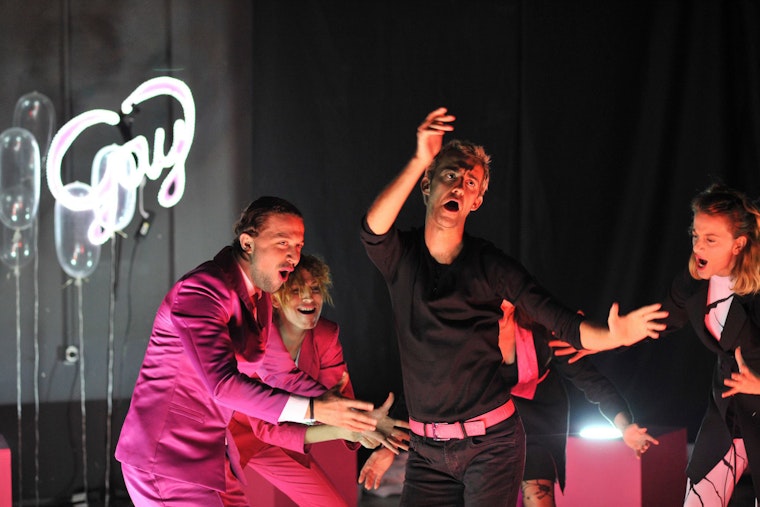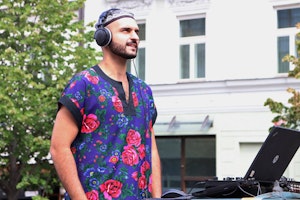Q&A: Fearless Theater in Kosovo

In the Balkans, art is confronting entrenched prejudices and building bridges to empathy. Beka Vučo, regional manager for the Western Balkans at the Open Society Initiative for Europe, speaks with Jeton Neziraj, Kosovar playwright and director of theater troupe Qendra Multimedia, ahead of the U.S. premiere of his play 55 Shades of Gay.
What is 55 Shades of Gay about?
A gay couple apply to get married in a conservative, deeply homophobic, and provincial town in the Balkans. But even though same-sex marriage is technically permitted by the country’s constitution—which was done in response to a mandate from the EU—a coalition of intellectuals, artists, politicians, and religious leaders tries to stop the marriage from happening. Fundamentally, it’s about whether sexual liberation is possible in the Balkans.
What was your inspiration?
Well, there is a long history of homophobic violence in the Balkans, so it’s something I’ve thought about a lot in general. But the initial idea for this specific play came a few years ago when I saw people expressing outrage on social media after a newspaper announced that a couple had registered the first same-sex marriage application in Kosovo’s history. Most of the social media response was predictably homophobic.
What stuck with me, though, was the way that officials from the town insisted the report was false. I don’t know whether or not they were telling the truth, but they seemed to be so triggered by the mere suggestion of a same-sex marriage application being made on their watch. That’s when the idea started.
What has the response from audiences and the media been like so far?
When we first produced the play in Pristina, we were of course wary of the public’s response. We did ask for a police presence at the premiere. Fortunately, though, none of our fears came to pass; the play opened without incident, which was a truly wonderful surprise—a triumph, even—and a sign of how Kosovar society is freeing itself of old prejudices.
That said, any time we showed the play, we received death threats, but we never really took them seriously. They just became routine. And while we would never take sole or direct credit for Kosovo’s first gay pride parade in 2017, the organizers did tell us that they were encouraged and motivated by our work.
Do you think theater is better than other art forms at promoting open society values?
I would say yes—and especially so with the type of theater we create, which is direct, political, and interested in raising issues that mainstream society might otherwise choose to ignore. I think that theater in some ways helps make social progress happen because it can show that things which are seen as subversive or dangerous are neither.
So, for example, having a play about LGBTI people, who some people see as abnormal, that helps normalize and humanize LGBTI people in the eyes of others. Theater can, I believe, take the pulse of society, and show a different world, in a direct and immediate way that other art forms can’t.
Should theater in an open society comfort audiences? Or should it challenge them?
I would say it should challenge them; at least that is what we are trying to do. Theater cannot accommodate everybody, and it shouldn’t try. A kind of theater that tries to make everyone happy, that doesn’t make sense to me.
Instead, I think theater should serve the same role as court jesters did in the past: daring to speak truth to power, to say the things that no one else has the courage or ability to say.
Speaking for myself and my work, I don’t want audiences, when they remember our work, just to remember the actors’ gestures or the stage design or so forth; I want them to feel strong emotions—empathy, fear, optimism, anxiety, sadness. Anything, so long as it’s real.
What do you hope will be 55 Shades of Gay’s legacy?
The worst kind of theater, I think, is the kind where the audience is the same afterwards as it was before; where there is no change at all. More specifically, though, I hope this play helps audiences empathize with the oppressed, the marginalized, and those who are victimized and voiceless.
I think that theater has to be free, unburdened by a responsibility to “change the world.” But I do hope this play makes people think a bit more about what it’s like to be less fortunate; I think that kind of imaginative empathy is a prerequisite for progress and social change.
The U.S. performances of 55 Shades of Gay received support from the Open Society Foundations.


